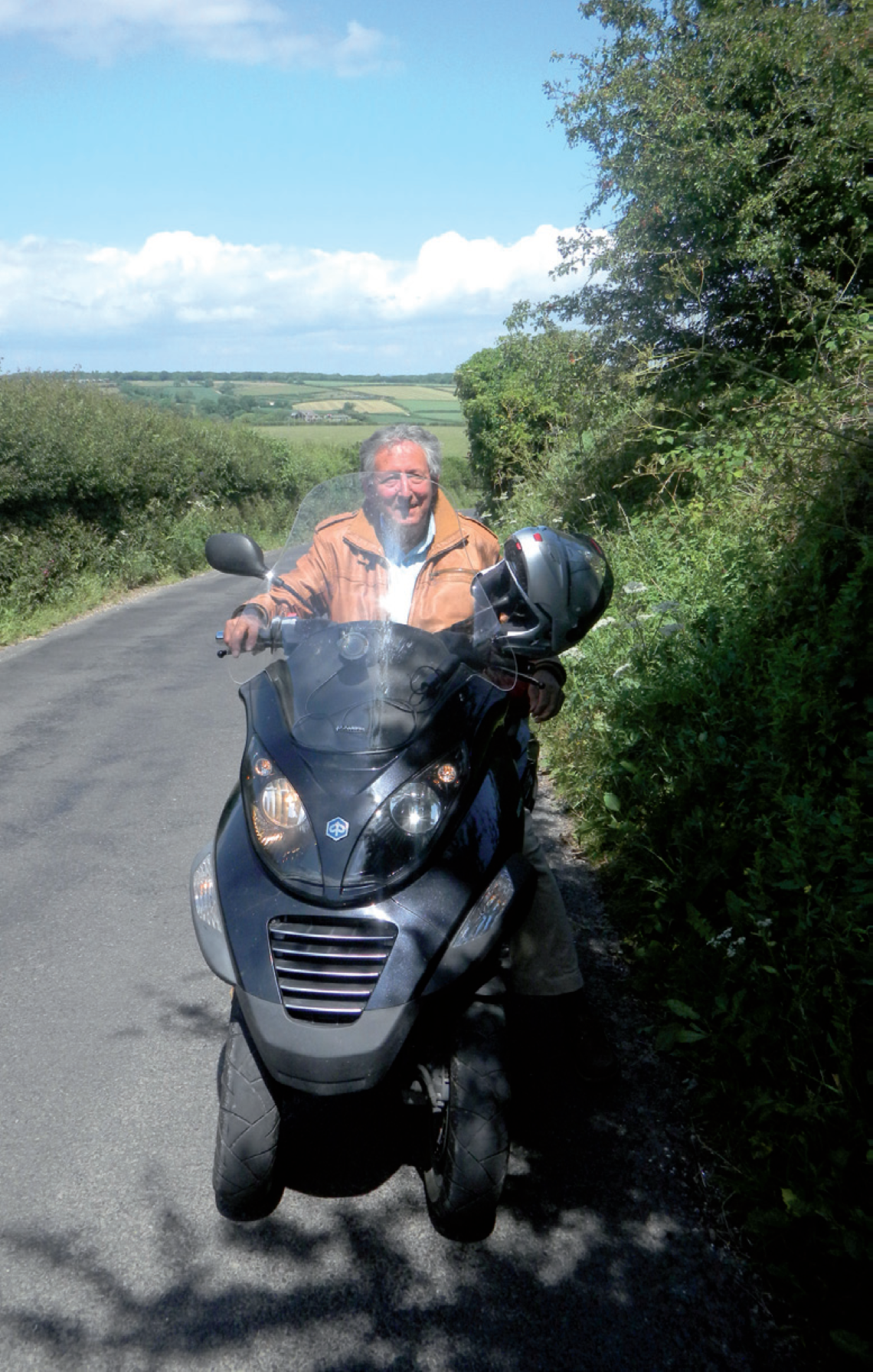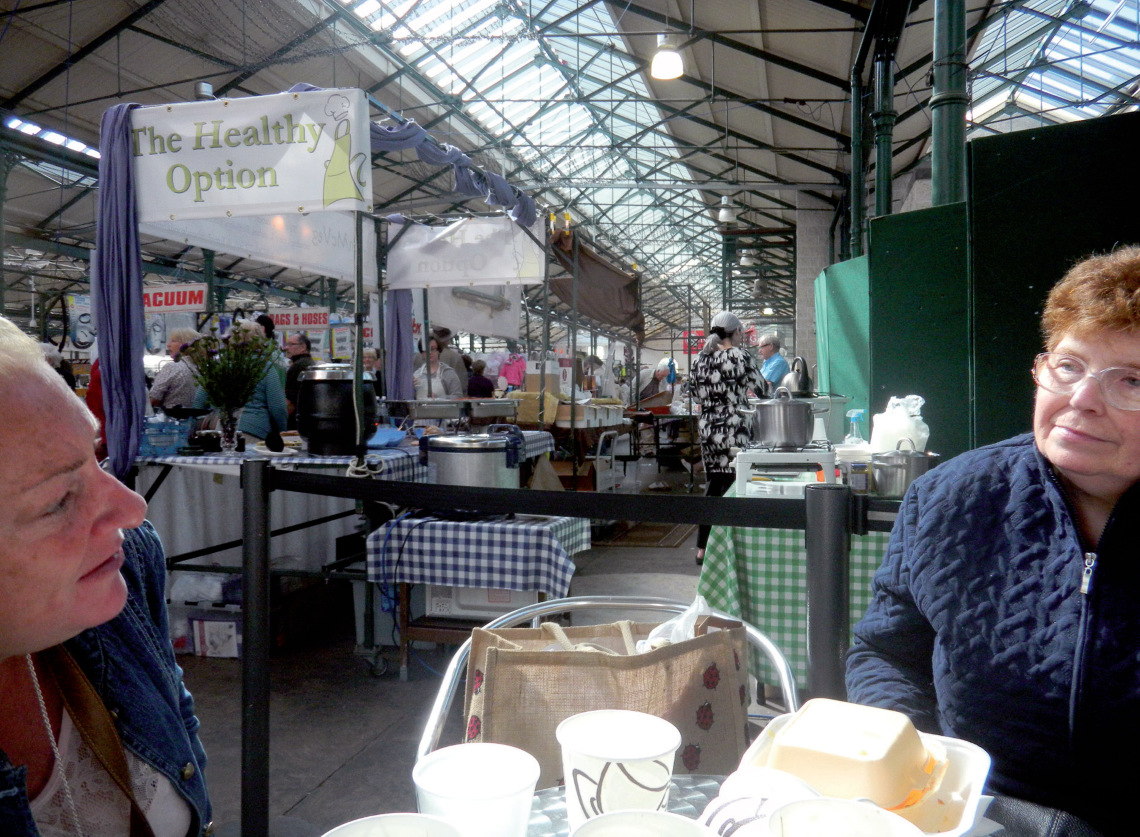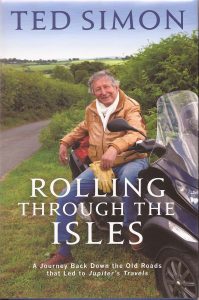In his latest book, the godfather of modern motorcycle travel, Ted Simon, returns to his roots to explore the British Isles and recall the escapades of his youth. We join our intrepid narrator as he reflects on that uniquely British ABR-ing institution: the greasy spoon
Where did the taste go?
The presentiments of rain that had been hanging over Cumbria during the last days were gone by morning, and I set off in bright sunshine to circle Lake Windermere on my way back to the A6 and to pay homage to the Jungle Café.
The Jungle Café is one of my fondest memories and yet, in truth, I can remember almost nothing about it beyond the huge sense of relief, warmth and comfort I felt when we went in, and the sheer pleasure of being given a full, substantial breakfast with nothing spared, nothing rationed. There were real eggs with deep yellow yolks, thick meaty bacon, bangers and mash, mushrooms, tomatoes, baked beans, fried bread and gallons of hot, sweet tea. If I’d had no other reason to sit in a lorry for twenty hours, I think I would have done it for a Jungle breakfast but not, I must admit, in winter. There was no heating in those old cabs. The manufacturers hadn’t even thought of closing the pedal vents with rubber screens, to keep the frigid air from screaming through, so I can only imagine what the Jungle Café meant to those drivers.
There were two ‘transport caffs’, as they were called, to give food and warmth to drivers going over Shap. The Eagle’s Nest on the summit of Shap was the other, concocted out of two buses joined at the rear like copulating dragonflies. There’s an old picture of it on the web. I never saw it myself, but I’m sure it was a very welcome refuge. The winter weather over Shap is fierce, amounting to blizzards at times. The long, slow climb to the top on the old A6 was interminable and the descent was even more treacherous, especially for older lorries. Snow and ice covered the surface, there were many sharp curves, and to add to the difficulties the road was often blanketed in thick fog. No doubt I romanticise the Jungle Café. If I were to see it today as it was then I would probably call it a dump, but such judgements taken out of the context of time and place have no real meaning. In the mid-forties, just before and after the war ended, there was nothing to compare it with.

I virtually never ate out. It would have been forbiddingly expensive, something done by posh people, and I knew of nowhere near me you could do it anyway, apart from British Restaurants. These were canteens set up by the government so Rolling Through the Isles people could eat where they worked, and they offered nothing better than school dinners. For a while my mother worked as a book-keeper for an advertising agent in Fleet Street, and once I took a bus to her office, though I can’t think why. The agent, a Mr Greenwood, had a thing for my mum, apparently, and he slipped a pound note into my hand and told me to take her out to dinner at the Strand Corner House. She didn’t care for him, and the bribe didn’t work, but we did go to the restaurant, which, to my twelve-year old eyes, was like a palace. That’s the only time, I think, that I ever ate out in London.
Food, throughout my childhood and up to the time I went to Paris, was a primitive commodity put together in straitened circumstances. Of course I had likes and dislikes so I can say that my tastes were sufficiently well developed to recognise that the canteen lunches we were served at school were pretty awful. They consisted, as I remember them, of cabbage, meat, gravy and potatoes. The meat was often a very thin slice of over roasted beef, but might also be Spam. The gravy was brown, watery and rather tasteless, and the meat swam in it with the potato. The cabbage was Rocky Horror green, having been boiled with soda. There were ‘sweets’, like spotted dick and custard, but all I remember about them was that they weren’t very sweet. There was nothing much wrong with it as food. In fact, our wartime diet was healthier than anything working people had eaten before. At home we were rationed to very small amounts of meat, butter, cheese and sugar, all the really tasty stuff. Only vegetables were unrestricted, but the British had never really figured out what to do with them. Fortunately my mother was able to dig back to her German roots and took pains to make things appetising. I remember that she chopped up the spinach, the bane of every child’s life, and mixed it with a white sauce that made it quite edible. The spinach back then was quite unlike today’s light green, tasty leaves: it was dark and leathery and so packed with oxalic acid that it set your teeth on edge, which was why Popeye was pressed into service to sell it to us.

It was quite customary then to eat more or less the same thing every day, just as we wore the same clothes every day. In fact, sameness was the outstanding feature of life in the forties. Every day was more or less the same, and Sunday was like the rest, but emptier. The interest and excitement in day-to-day life was what you conjured up for yourself, which I realise now was no bad thing. In my case it came from what I was learning in school, from books I was reading, from hobbies and, of course, the overarching excitement of a war in progress. What were Voroshilov’s tanks doing today? How far had Monty got in North Africa Food was only a minor source of pleasure. When I could get away with it I took the threepence I was given to pay for the school lunch and used it instead to buy a much tastier fishcake from a lady with a little shop in Fulham Road.
My eyes were opened to haute cuisine by a ship’s cook, a friend of my mother’s, who came over one day when she was sick and sliced up potatoes in front of my eyes at such speed that the knife, never more than a hair’s breadth from his fingers, was a blur. I have never mastered that particular skill, but his expertise propelled me into cookery. Because I was often alone at home after school I did experiments with cooking, but the results were not inspiring. What I lacked was ingredients. Mayonnaise, they say, was invented under siege by the chef to Napoleon’s Marshal Mahon, poor fellow, who had nothing to offer his master but eggs and olive oil. Well, we had neither. There was powdered egg and powdered milk and margarine, and I learned to make execrable omelettes, and scrambled eggs that rattled in the pan like grape-shot.
So, to come to the Jungle Café out of a black night on a lorry, into a warm room of scruffy men, with food frying steam on the windows, and to sit down to a plate loaded with a full English breakfast – well, why would it matter what the place looked like? The food was marvellous. By contrast, I’ve been to a few modern motorway restaurants, Little Chef, for example, that for all their glossy graphics and hygienic bathrooms are as cheerless as they are sterile. I would expect to get more nourishment by eating the photographs of the food on the menu than from the food itself: a total triumph of style over substance, where even the style is in bad taste.
How on earth did we get from the Jungle Café to Little Chef ? I’m sure Health and Safety had something to do with it, but it could be that the business model of the fast-food industry is most to blame. The art of eating well is reduced to the business of consumption. We had some great years in between, when the controls eased and vanished, when the fruit and exotic vegetables came in, and with them all the culinary styles of the Mediterranean and the Orient. I tasted my first avocado in Kensington in 1956. They hadn’t even got to Paris five years earlier. Gradually, and with great excitement, the coffee houses opened, restaurants flourished, people learned about new and delicious foods, and the years of plenty rolled in.
Now there are wonderful meals to be found all over the UK, but they’re expensive and we want to spend our money on gadgets and toys, so we’ve learned the fast-food tricks from America – we’ve discovered that with enough salt, sugar and fat you can smother the tastebuds for a third of the price. Back to George Orwell in 1935: ‘ . . . there is the frightful debauchery of taste that has already been affected by a century of mechanisation. . . take taste in its narrowest sense – the taste for decent food. In the highly mechanised countries, thanks to tinned food, cold storage, synthetic flavouring matters, etc., the palate is almost a dead organ.’
In a way I see the fast-food trap as a metaphor for our life today. You can load the salt, sugar and fat on to everything. Films? Think special effects, mayhem and superstars. Politics? Think non-stop news cycles, Murdoch and fear-mongering. Sport? Think grossly overblown multibillion- pound circuses like Formula One and the Olympics. Lifestyles? Think second mortgages, everything on tick, drugs and booze ad nauseam (literally, at two a.m. on weekends). The excess is both wretched and mediocre. We know none of its very good but we’re too lazy to work for anything better. For many who grow up without any particular aim in life (an all-too-common condition today), the only thing that seems worth doing is to make money. Those who can prey on those who can’t, but none of it is very satisfying. I am fairly sure that what really lies behind the latest rash of riots, which are happening as I write these words in 2011, is not criminality, or resentment, or original sin: it’s boredom and a dim sense of self-loathing.

Ted Simon’s Rolling Through the Isles (published by Little, Brown) is available now Priced £20 (hardback). For more, see www.littlebrown.co.uk. A full review of this book can be found on page 136


